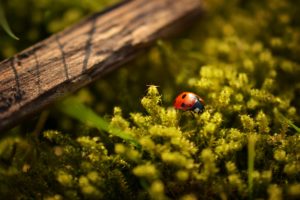 Integrated Landscape Pest Management (IPM), and it is an ecosystem-based strategy that focuses on cultural practices, using pest and disease resistant plants, releasing beneficial insects, and implementing smart design solutions to maximize ecosystem services. The definition of IPM from the National IPM Network is the following: “IPM is a sustainable approach to managing pests by combining biological, cultural, physical and chemical tools in a way that minimizes economic, health, and environmental risks.” When it comes to our landscapes, we tend to focus more on the beauty and appearance of our properties and neglect the fact that our landscapes are dynamic ecosystems. There are thousands of different types of critters big and small living in our landscapes. Some are beneficial, some are pests, but most are benign. Just because a pest or disease is present, doesn’t mean it will become a problem. It takes a trained professional to know which potential problem requires action.
Integrated Landscape Pest Management (IPM), and it is an ecosystem-based strategy that focuses on cultural practices, using pest and disease resistant plants, releasing beneficial insects, and implementing smart design solutions to maximize ecosystem services. The definition of IPM from the National IPM Network is the following: “IPM is a sustainable approach to managing pests by combining biological, cultural, physical and chemical tools in a way that minimizes economic, health, and environmental risks.” When it comes to our landscapes, we tend to focus more on the beauty and appearance of our properties and neglect the fact that our landscapes are dynamic ecosystems. There are thousands of different types of critters big and small living in our landscapes. Some are beneficial, some are pests, but most are benign. Just because a pest or disease is present, doesn’t mean it will become a problem. It takes a trained professional to know which potential problem requires action.
Using Trained Professionals
Trained horticulturists can identify potential problems long before any serious damage occurs. Understanding the landscapes’s ecosystems, professionals can find which potential problems require attention and treatment solutions. Maybe no treatment is required. If chemicals are required, begin with bio rational products and other products that are highly selective or specialized to a specific pest or disease. Products that kill indiscriminately are avoided. While traditional pest control is chemical intensive, IPM is knowledge intensive. The reality is, pests are a natural and necessary part of healthy landscape ecosystems. Pests are food for beneficial insects and birds. The goal is not eradication, but rather to ask more of your landscape and create a stable ecosystem in which pests cannot develop into pest problems. There are two types of recurring pests: the kind you find everywhere, and pests that are sporadic. The recurring pest attacks every single member of a species of plant year after year. They’re a regularly occurring part of our natural environment..On the other hand, a sporadic recurring pest is one that shows up every year, but it does not attack every single plant. To deal with recurring pests, we recommend including treatment for the usual suspects in your landscape contract because they are problems every year. The old saying about an ounce of prevention being worth a pound of cure is true with managing pests. A few plants to include in your annual treatment plan for preventing damage from recurring pests are , the apple scab disease that attacks the crab apple and hawthorn trees, the boxwood are susceptible to psyllids, Ash trees are prime targets for the Emerald Ash borer and Japanese Beetles like your rose bushes.
Getting to the Root of Pest Problems
In nature, there are always some landscape pests chewing on plants; that’s just the way it is. However, not all pest damage is significant enough to warrant action. Even the healthiest landscapes encounter bugs at one time or another. The sooner a pest is identified by your professional the easier it will be to manage using earth-friendly methods. Your landscape is a major investment, and routine landscape scouting protects your investment – but only if the landscape professional scouting your property understands what they are seeing. It takes training and experience to expertly identify and solve plant health problems. Distressed trees are more likely to suffer from pest problems. And it takes an expert to understand how to change the cultural conditions causing the root rot to flourish. Treating any of the symptoms without treating the real cause of all the problems is wasted money. Identifying and solving problems with growing conditions early on could prevent all these issues from occurring in the first place.
Taking A Proactive Pest Management Approach
IPM depends on frequent monitoring of plants or structures and the accurate diagnosis of the pests so that control strategies are used only when and where needed. A variety of control methods–cultural, mechanical, biological, and chemical–may be employed. IPM takes a look at the entire system and thus monitors the entire system, not singling out only one pest problem. By taking a proactive IPM approach to managing pests in the landscape, we address true pest problems and protect plant health—and we avoid using treatments that can harm beneficial insects, or do more harm than good. IPM involves taking a holistic approach, beginning with plant selection and choosing varieties that attract beneficial insects that will prevent harmful pests.
We do not want to work against a healthy ecosystem. When we ask more of our landscapes and care for them properly, we can create a healthy ecosystem.
Is your property not receiving the attention it deserves? Are you tired of overpaying for subpar service? First Green Landscaping provides the best value for professional lawn care and landscaping services in the Cincinnati / Northern Kentucky area. No property is too big or too small for First Green Landscaping.
Contact us (859-292‐8556) today for a free consultation!
—
 About First Green Commercial Landscaping
About First Green Commercial Landscaping
First Green Commercial Landscaping is a locally owned leading provider of lawn care and landscaping services in the Cincinnati / Northern Kentucky area. We provide superior customer service and strive to build long term business relationships with our clients.
- Lawn Care
- Landscape Maintenance
- Snow Removal
>> Learn More

 About First Green Commercial Landscaping
About First Green Commercial Landscaping